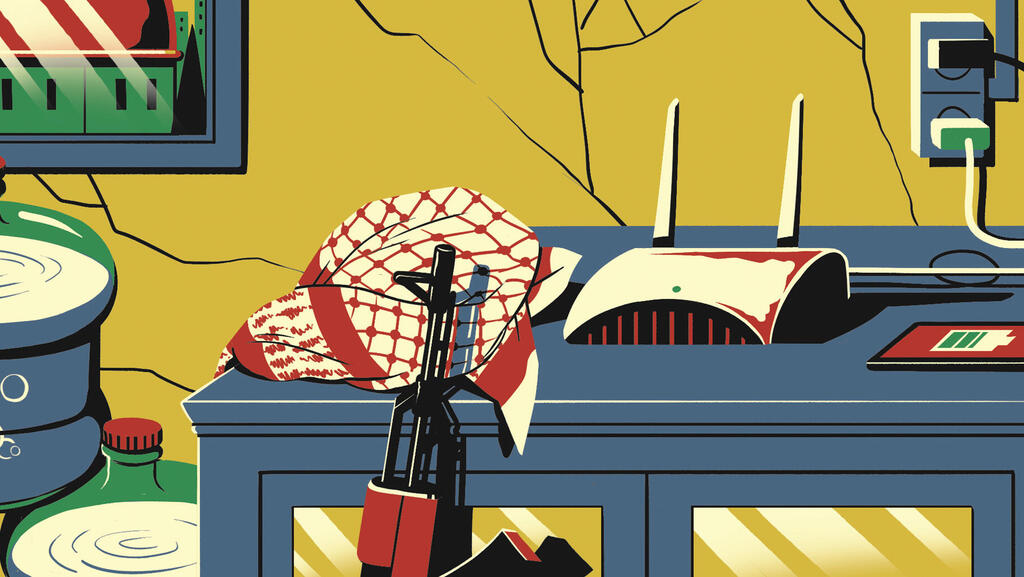
ISRAEL AT WAR
Cutting the cord: What’s the problem with disconnecting Gaza from the net?
Analysts working on their own behalf are attracting tremendous attention these days on social networks, and have become, in the eyes of many, relevant intelligence sources regarding what is happening in the war in Gaza. When untrained web surfers are seen as experts, the search for the truth becomes more complicated than ever before
Since the outbreak of Israel’s war with Hamas, internet traffic throughout the Gaza Strip has collapsed by over 80%. According to the digital rights association Access Now, the outages across Gaza resulted from a combination of direct attacks on civilian communications infrastructure such as cell towers and internet providers, restrictions on access to electricity, and technical disruptions to telecommunications services. All of these happened unevenly, sometimes unintentionally until October 27. So, in preparation for the IDF's ground entry into Gaza, the internet was completely cut off in the Gaza Strip in order to prevent any communication in the area. The Palestinian telecommunications companies Jawwal and Paltel announced a complete shutdown and only after 36 hours was the internet shutdown gradually removed. This was not the only time the IDF acted in such a manner. On November 1, there was another complete shutdown for the entire night. On the night of November 5, Gaza was again cut off from the internet, this time for over 15 hours.
When these events occurred, parts of the international community demanded that the internet be restored. Billionaire Elon Musk even said that his satellite company Starlink would provide internet services to Gaza. The World Health Organization (WHO) explained that due to the shutdown, it could not contact the medical teams or facilities. Local and international media channels claimed that the shutdown prevented them from contacting reporters on the ground and disrupted their ability to report on the war. Others explained that shutting down the internet for all residents of the Gaza Strip is a prohibited "collective punishment"; and others, including Access Now, claimed that the internet shutdown was intended to prevent documentation of IDF activities in the region, and under the cover of silence to achieve military goals, no matter the cost or the violations. The reaction was so strong that one could almost think that this was an unprecedented event, which has no justification or that ignores the ongoing and undecided debate about the internet as a right.
1. The state's responsibility to ensure connectivity
It may surprise some, but government-initiated internet shutdowns are a widespread phenomenon. The doctrine of shutting down the internet began to gain momentum during the Arab Spring and the demonstrations in Tahrir Square in Egypt in January 2011. Then-President Hosni Mubarak took the country offline for five long days. In March of that year, Muammar Gaddafi cut off Libya for three days which led to general condemnation from the international community.
In the past year, internet shutdowns have occurred significantly and for long periods of time by the governments of Bangladesh, the Democratic Republic of the Congo, Egypt, Indonesia, Iran, Iraq, Sudan, Myanmar, and Zimbabwe. The highest number of shutdowns year after year is India, which has been able to disable the internet for months in the disputed region of Kashmir. All these shutdowns were done and are still being done today by the governments towards their citizens. They also rarely receive attention from the international community and are mainly reported by organizations such as Access Now. Some shutdowns are not considered "turning off the faucet" and are done using indirect techniques that make the use of the internet impossible. For example, in Indonesia and Iran, the governments reduced the speed of the internet to the point where it was almost impossible to use it, and in Russia, they passed and implemented a law that gave the state the power and control to block anything, from a single message to closing Russia to all external connectivity. "Too often, key communication channels or entire communication networks are slowed down or blocked," the UN report in late 2022 said on these shutdowns, adding that this deprived "thousands or even millions of people of the only means to reach their loved ones, continue their work or participate in politics, discussions or decisions". The report stated that the #KeepItOn coalition documented 931 shutdowns between 2016 and 2021 in 74 countries, with some countries blocking communications repeatedly and over long periods of time. "The official justification for the shutdowns was unknown in the 228 shutdowns reported by civil society in 55 countries," the report said.
At the same time as this doctrine and as time passed, a discussion developed in Western countries about how the internet should be viewed - not as previously defined as a "service", but as "essential infrastructure", such as water and electricity. This discussion began following shutdowns that occurred as a result of low government investment in infrastructure and extreme climate events, as well as decisions by private internet infrastructure companies not to provide services to certain platforms. For example, the internet infrastructure companies Cloudflare and Amazon decided to stop hosting websites that promoted hate speech, such as the social network Gab, which became the home of everything that is anti-Semitic. The power of private companies to limit free speech or the state's neglect of internet infrastructure has pushed some to argue that the state has a responsibility to ensure connectivity, just as it has a responsibility to ensure water and electricity. Because access to the Internet is a basic right, an essential utility that cannot be lived without, and denying this infrastructure or failing to ensure it is a "practice of oppression" that creates fear and confusion.
2. In war there is a different interpretation of rights
Technological developments in the last fifty years have so profoundly changed the way our lives are conducted that it seems inevitable to require more advanced thinking about basic rights and the way to guarantee them. But all this discussion, as important as it is, was not done as part of a war between hostile parties. The UN report on the subject did not address the issue either. In these times, human rights, unfortunately, receive a different interpretation regarding their sanctity. The most basic right of all - to live - is violated under the auspices of war citing ideas such as relativity and reasonableness. Should a limited internet blackout during wartime meet the same standards as in times of peace? Is internet law really like clean water law?
Throughout human history, wars have also been waged in the information arena, and there have always been warlike efforts to disable or disrupt the enemy's ability to communicate. Whether these were mounted messengers, radio, or satellite communications, these were legitimate military targets. Even if harming them meant harming the public's ability to know.
Efforts to interrupt the transmission of information as part of the course of war should not be confused with an effort to damage means of communication in order to establish a particular narrative. The selective blocking of Arab news sites by emergency order by the Ministry of Communications is an example of harm that is not part of the direct war effort. This is government protectionism of the lowest kind. Whereas when the Israeli security forces shut down the internet in Gaza for limited periods of time at key moments of the fighting - this is not for propaganda purposes and silencing voices in an aggressive manner unbecoming of a democratic state. The purpose of the shutdowns is to harm the military goals of Hamas. Does this end justify the means? Maybe. And the question also arises as to whether it is proportionate and reasonable or, perhaps, just creates more fear among a civilian population that is in the midst of a war.
Digital Geneva Convention
The Digital Geneva Convention Initiative is a proposal to draft and adopt a new international protocol that will guarantee citizens protection against cyber attacks and recognize the role of technology companies in deploying services related to communication, data, and information as a humanitarian effort.















